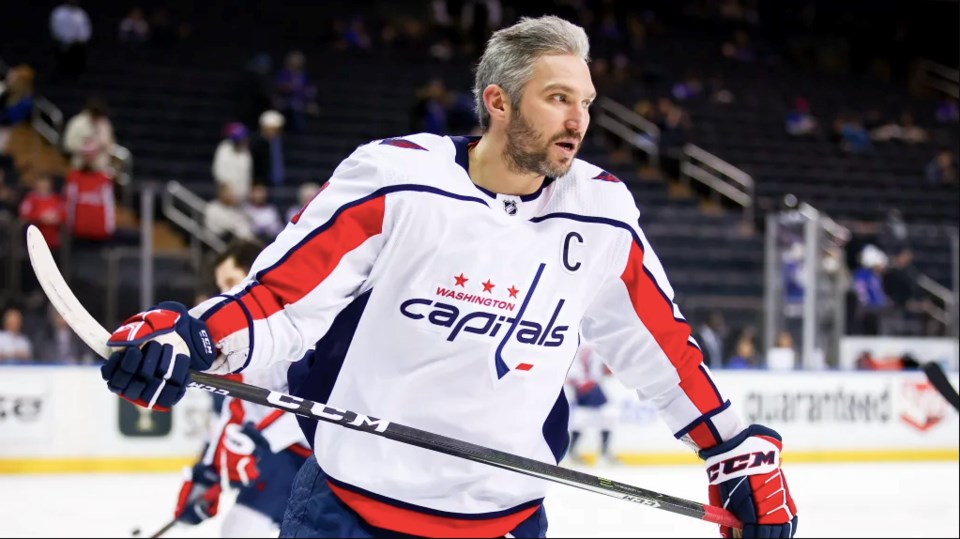Early last week, the world woke up to the frightening news that Russia has declared war on Ukraine and began invading the country.
Since then, social media has been rife with terrifying scenes from Ukraine’s capital, Kyiv, where people are hastily trying to evacuate while Russia unleashes bomb after bomb on the city.
As I’m sure many others in the news industry did, when I first heard of the invasion, I went straight to the trending page on Twitter to find more real-time updates on what was happening. And while scrolling through the trending topics, it wasn’t a surprise to see “Ovechkin” trending right alongside “Russia” and “Ukraine.”
Post after post was pondering what Russian superstar hockey player Alexander Ovechkin’s response to the war might be. And it got me thinking: who cares?
Why do we as media insist on putting every athlete right in the middle of the discussion on geopolitics happening in their country? At the best we get a clickbait headline with no real substance claiming Player X shares their stance on Issue Y.
But at worst, athletes speaking out about issues, especially Russian athletes criticizing Russian President Vladimir Putin, can lead to things getting really bad, really quick.
Take New York Rangers superstar Artemi Panarin for example. Last year Panarin criticized the political structure under Putin, comparing the Russian system in which most taxes go directly to Moscow, meaning other parts of the country get stuck in limbo with no government support, to the American one where taxes are used to improve cities in each state.
Almost immediately after he made his criticism, Panarin was labelled as a “foreign agent” by many in Russia and a fabricated assault allegation from 10 years prior was released to the media.
“I am more of a patriot than those people who hush up the problems,” said Panarin in a translated interview on a Russian news site in 2021. “They are playing with people’s emotions by saying that you have to love your country no matter what and hate others. I think it’s wrong. If I see issues and don’t talk about them, I think it’s a greater treason than when I talk about them.”
Following the allegation, Panarin was forced to take a leave of absence from the Rangers basically out of fear for his and his family’s safety.
Now, here’s the thing: professional athletes do have a huge platform, and I applaud the ones, like Panarin, who use it to speak out on issues they care about, especially if it could put them at risk of repercussions.
And we have had no shortage of these types of examples in the past, whether it’s Colin Kaepernick’s protest of police brutality in the U.S., basketball player Enes Kanter Freedom, whose outspoken stance on the Chinese Communist Party led to Chinese state media refusing to broadcast any games he played in, or more recent examples like Andrey Rublev, who wrote “no war please” on the camera screen after advancing to the finals of the Dubai Tennis Championships last Friday, or German F1 racer Sebastien Vettel refusing to race in the Russian Grand Prix.
But we need to let athletes use their platforms when they want, or it leads to the same stale and recycled answers that we saw during the Black Lives Matter movement, where almost every player asked said they were just “watching, listening and learning” about the protests and the movement.
So what good does it do to ask a guy like Ovechkin about the situation between Russia and Ukraine? He’s known to be a supporter and close friend of Putin, so all we’re doing by asking him to speak on it is hoping we get something that makes us feel OK about continuing to cheer for him on the ice.
What do you even expect Ovechkin to say? That he fully supports his country murdering thousands of innocent Ukrainians? Doubtful. What we are going to get almost every time we put an athlete in that kind of awkward situation is exactly what we got: a toeing-the-line response about how hard the situation is, how he can’t control anything and how he hopes for peace in both countries, without any criticism that could put him and his family in danger.
And if we already know what we’re going to get, what’s the point in doing this every time there’s another crisis somewhere in the world?
Maybe instead, we can just ask them how they are holding up, how their families are doing amidst the scary and difficult situations. You know, treat them like people instead of political pundits who we hope will give us some juicy quotes that will lead to lots of clicks but no real impact whatsoever.
If they want to speak on it, they will. But let’s stop forcing athletes to be anything more than just that: athletes.



